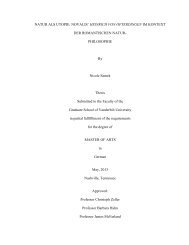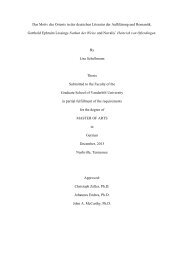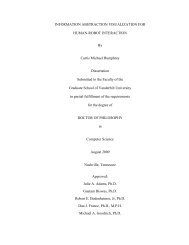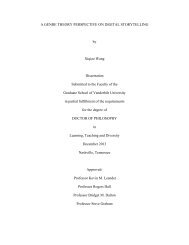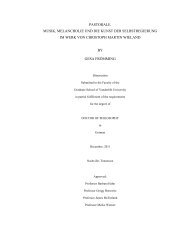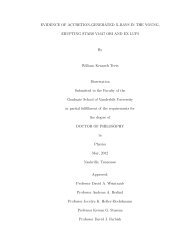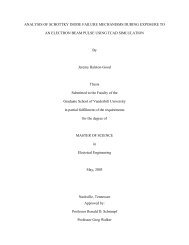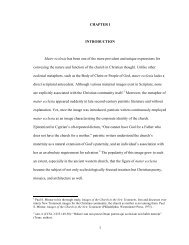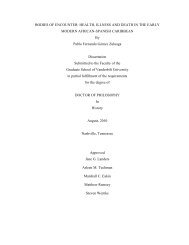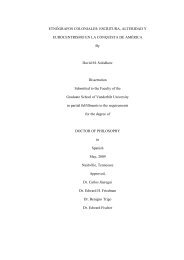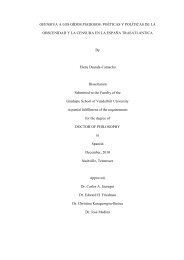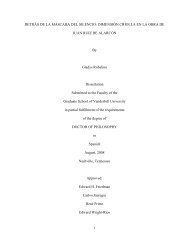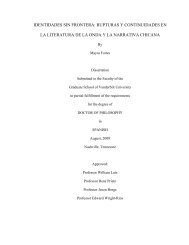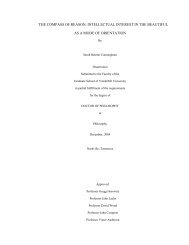THE DEATH OF DIONYSOS - ETD - Vanderbilt University
THE DEATH OF DIONYSOS - ETD - Vanderbilt University
THE DEATH OF DIONYSOS - ETD - Vanderbilt University
Create successful ePaper yourself
Turn your PDF publications into a flip-book with our unique Google optimized e-Paper software.
Wilhelm’s twofold attraction to aristocracy and theater, as well as his mistrust of<br />
productive, profitable activity, follow from his conception of personality–both the source<br />
and the manifestation of individual identity–as inseparable from representation. The<br />
linkage is not accidental. In both English and German the mediaeval word person referred<br />
originally to the characters in a play and the masks they wore, reflecting their origin in the<br />
Latin persona. By extension the word applied to the roles occupied by such individuals as<br />
performed prominent social functions, typically within the hierarchies of church and court.<br />
The similarities extended to the standard costumes and customs that were defined strictly<br />
for either theatrical or social personae. The semantic range of person extended to include<br />
the actual body of a living, breathing soul: a costume, too, after all, that would return in<br />
the end to ashes and dust. But by the eighteenth century the meaning of the word in<br />
English had undergone a shift that registered the presence and importance of a wealthy<br />
and influential middle class. Beyond naming a dramatic, literary or aristocratic character,<br />
person was more likely to signify the unique individual, and personality those physical<br />
and psychological traits that distinguished him or her from others. Still more striking is<br />
the fact that, in the legal jargon of an increasingly merchant and industrial economy,<br />
“person” referred to the private individual as distinct from the functions he performed. In<br />
a very literal way, the genteel significance of person and personality changed hands, just<br />
as so much of the property of aristocratic families was liquidated and added to the capital<br />
of the middle class. The person, then, as distinct from his vocation, was the private<br />
individual, who discovered and cultivated his unique personality in the intimacy of home<br />
and family.<br />
While the meaning of the German words follows largely similar lines, the changes<br />
appear to have taken place more slowly than in English. 17 Person retained much longer in<br />
Germany than in England–even into the nineteenth century–its primary meaning of<br />
dramatic or social representation, accumulating only slowly, like layers of sediment, the<br />
17 See entries for “person” and “persönlichkeit” in: Deutsches Wörterbuch von Jacob und Wilhelm<br />
Grimm, vol. 13, ed. Matthias von Lexer (Munich: Deutscher Taschenbuch Verlag, 1984), pp.<br />
1561-1562 and 1567-1568. Compare “person” and “personality” in: The Oxford English<br />
Dictionary, 2 nd ed., ed. J.A. Simpson and E.S.C. Weiner, vol. XI (Oxford: Clarendon Press, 1989),<br />
pp. 596-598 and 602-603.<br />
13



